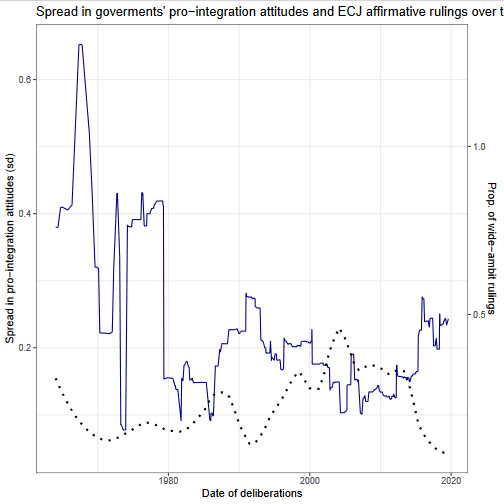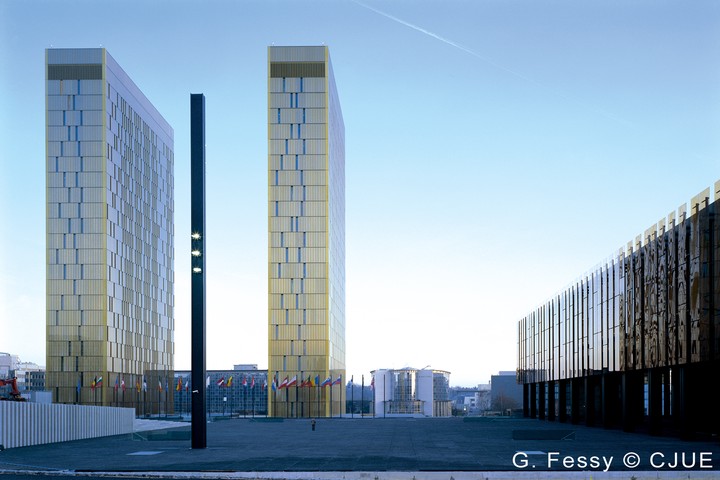How does the CJEU relate to its external interlocutors; litigants, the legal community and governments? These projects argue that the CJEU actively seeks alliance partners beyond governments. They also explore how the Court pursues its own interests without running against member states’ wishes.
Courting litigants: relationship with civil society
- “Leveling and Spotlighting: How International Courts Refract Private Litigation to Build Institutional Legitimacy” with Tommaso Pavone and Louisa Boulaziz presented at EUSA 2022 (Miami)
Private actors are increasingly turning to international courts (ICs). We argue that ICs can refract private litigation to build legitimacy and mitigate intergovernmental backlash. By leveling the odds for individuals and spotlighting their claims over those of more resourceful litigants, ICs cultivate civil society support and legitimate judicial policymaking in intergovernmental polities where individuals are disempowered. We evaluate this argument by scrutinizing the first IC with private access: the European Court of Justice (ECJ). We trace how ECJ judges privilege individuals in their advocacy and assess if they match words with deeds. Leveraging an original dataset, we find that the ECJ “levels”, supporting individual claims over businesses boasting larger and more experienced legal teams. The ECJ also “spotlights” its support for individuals through press releases that get amplified in law reviews. Our findings challenge the view that ICs build legitimacy by stealth and the ``haves’’ come out ahead in litigation.
A draft of the paper can be found here.
The Court’s relationship with governments
- Judicious judging: The effects of political division on decision making in the European Court of Justice with Urska Sadl presented at APSA 2022 (Montréal)
How do courts react to political debate? Their legitimacy hinges on their ability to uphold the law impervious to political pressure. The authority of the ruling follows from the court’s reputation as apolitical. Politicization – understood as salient questions that divide stakeholders – threatens to erode this image. It imposes conflicting demands: Courts can prove their worth by solving questions for which there is a demand for a legal solution, but they risk their reputation in a politically divided environment.

Literature on judicial independence focuses on direct and explicit threats issued by the political branch. Arguments of legislative override typically predict that political division empowers the judiciary. In contrast, we argue that courts are sensitive even to the potential eruption of conflict because they value their diffuse legitimacy. Effective judicial policy making is thus a question of strategic timing.
To test our theory, we study the European Court of Justice. Known as the “dark horse of integration”, it is an independent court with political sway. Yet political considerations profoundly affects its decision making. We draw on unprecedented data mapping out the legal ambit of all preliminary cases relating to the Free movement of people throughout the history. We find that the Court holds back on the legal ambit of rulings, preferring to bolster its institutional authority, in times of political division. Reversely, it broadens the ambit when salience is high and conflict low. Thus, when salience and division combine, they null each other out; leaving traces only in the decision-making process.
- Litigating in the European Court of Justice: Lawyers’ influence on supranational decision-making with Tommaso Pavone and Louisa Boulaziz presented at ECPR 2021 (zoom)
This paper assesses how private litigants’ propensity to win cases before international courts is conditioned by the quality of their legal counsel and by the constraints of intergovernmental politics. Building on legal mobilization and party capability theories, we argue that quality legal counsel bolsters a private party’s capacity to convey legal information to judges that is relevant to deciding the case in their favor. At the same time, we build on intergovernmentalist theories of international adjudication positing that judges will also be sensitive to political signals by national governments. As a result, we hypothesize that the influence of quality legal counsel on international judges is conditioned by the political support that member states’ express.
To assess these claims, we exploit an original dataset of parties and lawyers involved in disputes before the European Court of Justice (ECJ) – arguably the most successful and influential international court procuring access to private litigants. We find being represented by a lawyer bolsters the probability that litigants submit observations and win cases before the ECJ, yet this effect is the highest in the minority of cases where a majority of more member state governments intervene in favor of the applicant. We conclude by highlighting the necessity of combining theories of legal mobilization and intergovernmental politics in order to explain judicial decision-making in international courts.
